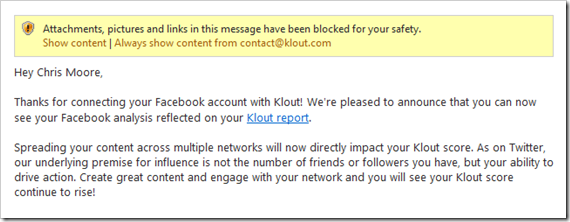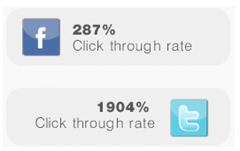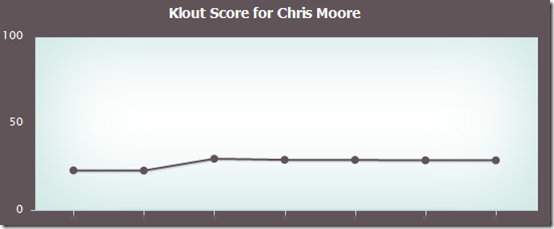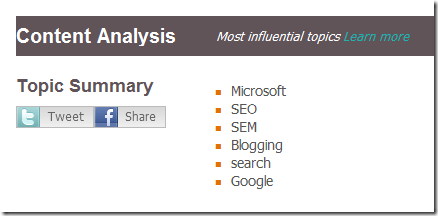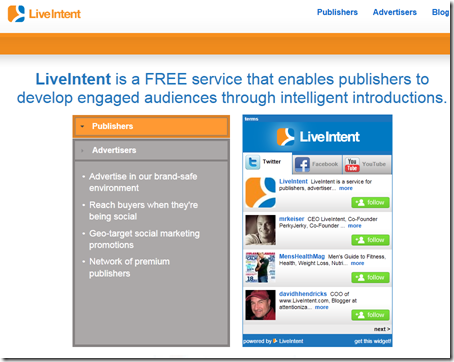Klout.com now also considers Facebook for influencer scores
Klout.com is a relatively new site which calculates a ‘Klout’ score to represent someone’s level of influence on social networks.
The score is calculated using a number of factors such as number of followers and percentage of posts retweeted. Up until now, Twitter has been the only social network which Klout has used to generate scores, however I just got an email from them notifying me that my Facebook account (which I have previously connected to Klout) is also now used to contribute towards my Klout Score…
Facebook and Twitter social networks are very different
This is very interesting, because most people have a completely different network of ‘friends’ on Facebook to what they do on Twitter. The more personally and socially connected nature of Facebook (in relation to Twitter) suggests that there will be a significant number of people who may not have influence on Twitter, but DO have significance influence on Facebook through their 1st, 2nd and even 3rd degree friend connections.
Fast Company recently reported that the amount of links shared on Facebook is WAY higher than Twitter, however the click through rate on Twitter is WAY higher than Facebook...
Whilst users may not be ‘clicking through’ as much from Facebook, I suspect that the ‘like’ rate and ‘view’ rate (for videos/photos) is WAY higher again than Twitter click through rates. How do the two types of influence compare?
Facebook is more social, but is it just as influential as Twitter?
Typically Tweeters follow each other for business, or another shared areas of interest. Facebook on the other hand represents networks mostly formed by social connections.
If I share information about the latest Search Engine Optimisation technique with my Facebook network, most of my ‘friends’ will ignore it, or ask “what the heck I’m talking about?!”. If I tweet the same message, my numerous followers interested in the web will be keen to share it with their respective network of web and search professionals.
This does not mean that I am less influential on Facebook. In fact, I have a large collection of friends who live in my local town on my Facebook friends list, so my links, comments, videos and photos about local businesses and events can be very influential.
So what does Facebook Klout look like?
According to Klout.com, my Facebook profile does not seem to have had a huge effect on my Klout score…
Perhaps this is because it considers my Twitter profile WAY more influential and therefore dwarfing the effect of my Facebook activity. Or perhaps my primarily social activities on Facebook make me only an influencer within my small group of local and work related ‘friends’, so my Facebook Klout really does not pack much of a punch at all.
It is interesting to see how it calculates some of the values based on a combination of the Twitter variables (in green) and Facebook (in blue). Here is the breakdown for my ‘true reach’…
So 70% of my Facebook posts are ‘liked’! That seems pretty good to me! Much better than the 4% retweet rate from Twitter. I guess the question here is what impact is reaching someone who has ‘liked’ my post, compared to having someone click a link I share on Twitter. I quite often ‘like’ my friend’s facebook updates which read ‘Carrie had Sugarpuffs for breakfast’, but it doesn’t mean she influenced me…or does it?
There are also amplification and network variables which measure the likelihood that your content will be acted on, and the influence level of your engaged audience respectively.
What do they need to make it complete? And even then, would I trust it?
Whilst there is a lot of 2 way interactions on Twitter, it is more common for people to ‘broadcast’ information and links, with the intention of getting them shared virally. Facebook has less of a broadcast dynamic, and more of a multidimensional socially connected set of networks encouraging 1:1, 1:many and many:1 relationships focussed around friendships, relationships, hobbies and even a bit of business.
Facebook is without a doubt the number 1 store of social connections on the web, however the professional nature of LinkedIn makes it a valuable data store to indicate how people are connected in business. If Klout could pull in LinkedIn data and effectively merge it with FB and Twitter information, they would seem to have a relatively complete view of social interaction and influence online.
Even if they do pull in data from all three, the secret is still in the sauce. I would love to see the algorithms Klout are using to calculate influence (I didn’t want to use the word ‘klout’ twice in that sentence), and would loved to have been in the discussions where they were trying to figure out how to merge Facebook with Twitter data. In fact, without knowing how they do it, I’m not sure that I completely trust the results! Now there’s a dilemma.
It’s all about topics
Whilst it’s very cool to look at your own analysis and see how Klout classifies you, the question is how useful actually is this data?
Of course knowing that I am influential (or not) on Twitter is not useful to any business unless they know what topics I am influential on. Klout is capable for extracting out topics which relate to each users Klout score, here is mine (seems pretty accurate)…
Right now, they do not have a function built in to the site which allows you to search for a topic and find top influencers. This information is available through their API however, and some companies have already started to use it. E.g. www.liveintent.com which enables publishers to connect with influential audiences identified using data from Klout…
Author: Chris Moore is a program manager from Microsoft working on Search Engine Optimisation. Follow him on Twitter
